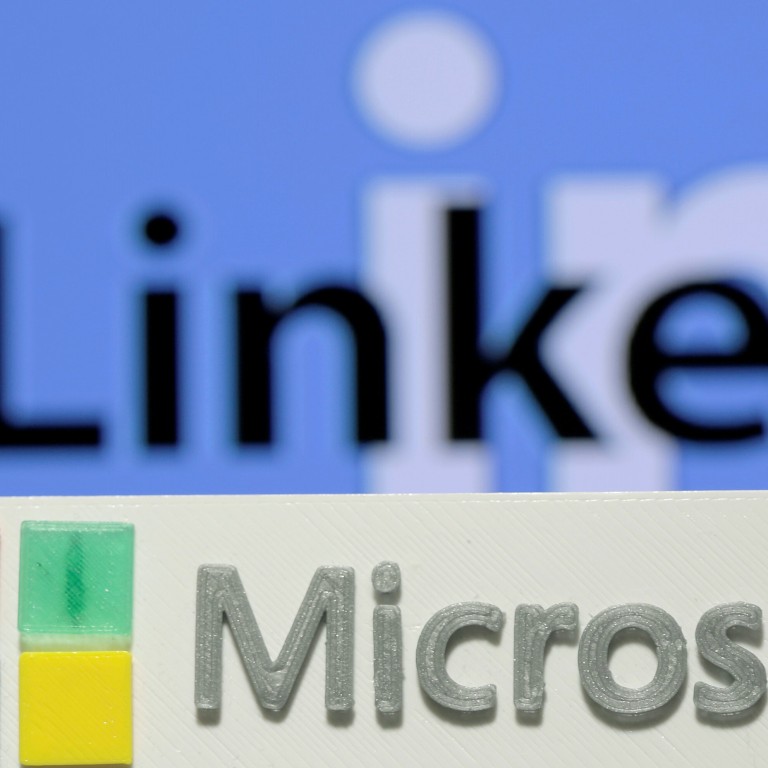
Lawmaker asks LinkedIn, Microsoft why they censored US journalists’ accounts in China
- The three targeted reporters had written about the mass internment camps in Xinjiang, Tibet and deteriorating press freedoms in China, among other topics
- Action by the professional networking platform is ‘a gross appeasement and an act of submission’ to the Chinese government, US Senator Rick Scott says
A United States senator wrote to Microsoft and LinkedIn on Thursday demanding an explanation for the professional networking platform’s recent decision to block China-based users accessing the accounts of several US journalists.
Earlier this week, LinkedIn blacklisted the accounts of Axios’ Bethany Allen-Ebrahimian and independent journalists Melissa Chan and Greg Bruno, the latest in a string of actions the Silicon Valley-headquartered company has taken to preserve access to the Chinese market.
LinkedIn is owned by Microsoft.
In a letter to Microsoft CEO Satya Nadella and LinkedIn CEO Ryan Roslansky, Senator Rick Scott, a Republican from Florida, called the move a “gross appeasement and an act of submission” to the Chinese government.
“The censorship of these journalists raises serious questions about Microsoft’s intentions and its commitment to standing up against Communist China’s horrific human rights abuses and repeated attacks against democracy,” wrote Scott, who serves on the Senate committee on commerce, science and transportation.
Scott’s letter was first reported by Axios.
LinkedIn is the only major Western social media platform that Beijing permits to operate in China – an arrangement in which the website has agreed to take action against users deemed in violation of Chinese law.
“While we strongly support freedom of expression, we recognised when we launched that we would need to adhere to the requirements of the Chinese government to operate in China,” the platform has previously said in takedown notifications to targeted users.
LinkedIn reverses course after censoring human rights activist’s page
In a statement, LinkedIn said it was a “global platform that respects the laws that apply to us, including adhering to Chinese government regulations for our localised version of LinkedIn in China”.
The company did not respond to questions about which specific content on the users’ pages triggered the takedown or whether the move resulted from a direct request by Chinese authorities.
All three users cited in Scott’s letter reported that they received the takedown notifications from LinkedIn on Tuesday. As a result of the blacklisting, targeted users’ pages are not viewable in China, nor are comments they post on the platform or any other content they share.
According to a screenshot Allen-Ebrahimian posted to Twitter, LinkedIn told her that unspecified content in her “summary” section was the reason for the action.
In a similar message Bruno posted to Twitter, LinkedIn told him their action was prompted by content in the “publications” section of his page, which lists a 2018 book he wrote about China’s “soft-power war on Tibet”.
Chan’s page includes references to deteriorating press freedoms in what she calls the “authoritarian state” of China, as well as her expulsion from the country as a reporter in 2012.

Among his demands of Microsoft and LinkedIn, Scott asked whether Chinese authorities had directed LinkedIn to take the action against the three US journalists, and requested a tally of the number of accounts that have been blocked to date.
LinkedIn was censured by Chinese regulators earlier this year for failing to adequately screen political content, The New York Times reported. After the March meetings, the platform carried out a spate of takedowns against a number of users, including one congressional staff member.
That prompted an inquiry by US Representative Jim Banks, Republican of Indiana, who wrote to LinkedIn’s Roslansky asking for details on which of Beijing’s “speech regulations” the platform enforces.
In the letter, dated September 24, Banks also requested information about whether LinkedIn had ever provided user data to Chinese authorities.
Zoom closes account of US-based Chinese dissidents after Tiananmen conference
One of the highest-profile blacklistings by Linkedin occurred in 2019, when it blocked visibility in China of the page of Zhou Fengsuo, a US-based human rights activist once No 5 on Beijing’s most wanted list for his role in the Tiananmen Square protests.
After an uproar over its move, Linkedin swiftly reversed course, alleging that Zhou’s page had been “blocked in error”.
Zhou was again the target of an alleged attempt by a Western tech company to police his online activity when, in 2020, his Zoom account was shut down by the videoconferencing company over a virtual vigil he organised to commemorate the Tiananmen Square crackdown.
That episode prompted US prosecutors to bring criminal charges against a China-based Zoom executive, accusing him of secretly logging into online vigils to disrupt them and then fabricate reasons to report the meetings for violating terms of service.
In a warning to US companies with operations in China, the assistant attorney general for national security at the time, John Demers, said: “No company with significant business interests in China is immune from the coercive power of the Chinese Communist Party.”
The case against the Zoom executive “[laid] bare the Faustian bargain that the PRC government demands of US technology companies doing business” in China, Demers said.

